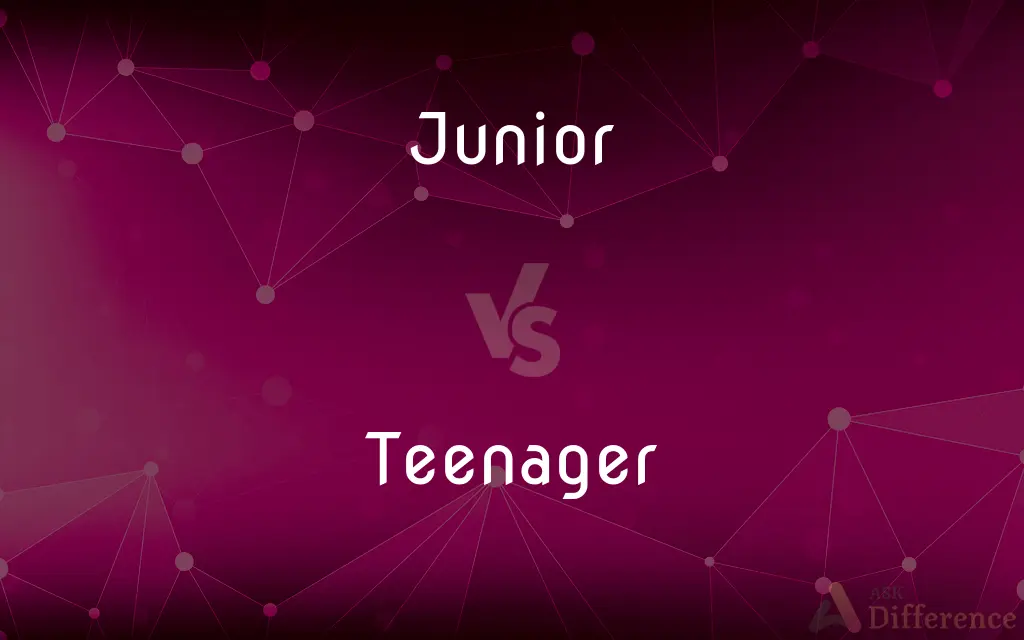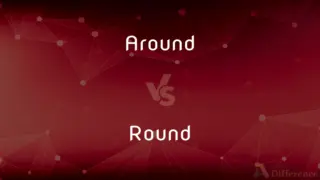Junior vs. Teenager — What's the Difference?
By Urooj Arif & Fiza Rafique — Updated on March 26, 2024
Junior refers to a young person, often below the age of 18, or a specific rank/grade, while teenager denotes someone aged 13 to 19, emphasizing the adolescent stage of life.

Difference Between Junior and Teenager
Table of Contents
ADVERTISEMENT
Key Differences
The term "junior" can have a broad application, referring to younger individuals in general or to specific roles or positions that denote a lower rank or grade, such as in schools (e.g., junior year in high school) or in job titles. In contrast, "teenager" specifically describes individuals within the age range of 13 to 19 years, focusing on the adolescent period of human development.
When discussing age groups, junior often pertains to children and adolescents under 18, highlighting their status in relation to adults or more senior positions. Teenager, however, clearly delineates the age group experiencing puberty, navigating the transition from childhood to adulthood, and facing unique social, emotional, and educational challenges.
In the context of education, a junior can refer to a student in the third year of high school or college in the United States, marking a specific stage in their educational journey. On the other hand, the term teenager encompasses students at various levels of middle and high school, without specifying their academic progress.
In sports or extracurricular activities, "junior" might categorize younger participants or those with less experience, not necessarily tied to a specific age. Teenagers, in these contexts, are recognized by their age group, often participating in divisions or competitions designed for their developmental stage.
The perception of juniors and teenagers can differ significantly. Juniors are often seen as those still heavily reliant on parental guidance and support, while teenagers are increasingly viewed as seeking independence, forming their identity, and making decisions that will impact their future.
ADVERTISEMENT
Comparison Chart
Age Range
Broad, often under 18; specific to context.
Strictly 13 to 19 years old.
Context
Can denote rank/grade or younger individuals in general.
Specifically refers to the adolescent stage of life.
Education
Can refer to the third year in U.S. high schools or colleges.
Encompasses a broader age group in middle and high school.
Sports/Activities
Categorizes younger or less experienced participants.
Age-based divisions, focusing on developmental stages.
Cultural Perception
Seen as more dependent on elders.
Viewed as seeking independence and forming identity.
Developmental Stage
Varies; can include early childhood to late adolescence.
Focuses on adolescence, a key developmental period.
Compare with Definitions
Junior
Often used to denote children under 18.
Junior tennis leagues are for players under 18.
Teenager
An individual aged between 13 and 19 years.
Teenagers often face significant social pressures.
Junior
Can indicate a lesser role in a job title.
He was promoted from Junior Analyst to Senior Analyst.
Teenager
Deals with unique developmental challenges.
Teenagers navigate the complexities of identity formation.
Junior
Refers to the younger of two people with the same name.
John Doe Junior is named after his father.
Teenager
Represents the adolescent period of life.
As a teenager, she won several art competitions.
Junior
A young person or someone of a lower rank/grade.
She's a junior at Lincoln High School.
Teenager
Associated with high school students.
The program is designed for teenagers thinking about college.
Junior
In education, specifically the third year of high school or college.
As a junior, she began exploring colleges.
Teenager
Often viewed as seeking independence.
Teenagers typically start to seek more independence from their parents.
Junior
For or denoting young or younger people
Junior tennis
Teenager
A person between the ages of 13 and 19; an adolescent.
Junior
Low or lower in rank or status
Part of my function is to supervise those junior to me
A junior minister
Teenager
A person whose age is in the teens, i.e. one between the ages of 13 to 19 inclusive.
Junior
A person who is a specified number of years younger than someone else
He's five years her junior
Teenager
A juvenile between the onset of puberty and maturity
Junior
A person with low rank or status compared with others
An office junior
Junior
Abbr. Jr. Used to distinguish a son from his father when they have the same given name.
Junior
Intended for or including youthful persons
A junior sports league.
Junior
Lower in rank or shorter in length of tenure
A junior officer.
The junior senator.
Junior
Of, for, or constituting students in the third year of a US high school or college
The junior class.
Junior
Lesser in scale than the usual.
Junior
A person who is younger than another
A sister four years my junior.
Junior
A person lesser in rank or time of participation or service; subordinate.
Junior
A student in the third year of a US high school or college.
Junior
A class of clothing sizes for girls and slender women. Also called junior miss.
Junior
(comparable) Low in rank; having a subordinate role, job, or situation.
Junior
Younger.
Junior
(not comparable) Belonging to a younger person, or an earlier time of life.
Junior
Of or pertaining to a third academic year in a four-year high school (eleventh grade) or university.
Junior
A younger person.
Four years his junior
Junior
A name suffix used after a son's name when his father has the same name (abbreviations: Jnr., Jr., Jun.).
Junior
A third-year student at a high school or university.
Junior
(legal) A junior barrister.
Junior
Less advanced in age than another; younger. Abbreviated Jr.
Junior
Lower in standing or in rank, or having entered later into a position or office; as, a junior partner; junior counsel; junior captain; the junior Senator from New York.
Junior
Belonging to a younger person, or an earlier time of life.
Our first studies and junior endeavors.
Junior
A younger person.
His junior she, by thirty years.
Junior
One of a lower or later standing; specifically, in American colleges and four-year high schools, one in the third year of his course, one in the fourth or final year being designated a senior; in some seminaries, one in the first year, in others, one in the second year, of a three years' course.
Junior
Term of address for a disrespectful and annoying male;
Look here, junior, it's none of your business
Junior
A third-year undergraduate
Junior
The younger of two men
Junior
A son who has the same first name as his father
Junior
Younger; lower in rank; shorter in length of tenure or service
Junior
Used of the third or next to final year in United States high school or college;
The junior class
A third-year student
Junior
Including or intended for youthful persons;
A junior sports league
Junior fashions
Common Curiosities
Why are teenage years considered important?
They represent a critical period of physical, emotional, and social development.
Is the term "junior" used globally?
Its use varies, especially in education; some countries use different terms for school years.
How do educational systems cater to juniors and teenagers?
Education for teenagers is broadly aimed at development, while juniors in specific grades receive targeted curriculum.
What distinguishes a junior from a teenager?
"Junior" can refer to age or rank without a strict age limit, while "teenager" specifically denotes ages 13 to 19.
Can someone be a junior in a job and still be a teenager?
Yes, it's possible for teenagers to hold junior positions in part-time or entry-level jobs.
What roles do parents play in the lives of juniors and teenagers?
They provide guidance and support, though teenagers may seek more autonomy.
How do juniors and teenagers view their future?
Both groups may be forward-looking but with varying degrees of independence and decision-making power.
How does society view juniors and teenagers differently?
Juniors are often seen as more dependent, while teenagers are viewed in the context of gaining independence.
Can a junior also be a teenager?
Yes, a junior (e.g., in high school) often falls within the teenage age range.
Do juniors and teenagers face different challenges?
Challenges overlap, but "junior" in certain contexts might not specifically address the unique aspects of adolescence.
How do extracurricular activities differ for juniors and teenagers?
Activities may be designed based on developmental stages, with teenagers often participating in more competitive or complex levels.
Are there specific laws affecting juniors and teenagers?
Laws often address minors in general, with some specific considerations for teenagers, like work permits or driving licenses.
How can society support the healthy development of juniors and teenagers?
Through supportive environments, education tailored to developmental stages, and opportunities for independence and growth.
What challenges do juniors face in schools?
They navigate academic pressures, social dynamics, and preparation for future educational steps.
Why is adolescence a critical time for teenagers?
It's a phase of significant growth, learning, and identity formation, with both opportunities and challenges.
Share Your Discovery

Previous Comparison
Client vs. Clientele
Next Comparison
Around vs. RoundAuthor Spotlight
Written by
Urooj ArifUrooj is a skilled content writer at Ask Difference, known for her exceptional ability to simplify complex topics into engaging and informative content. With a passion for research and a flair for clear, concise writing, she consistently delivers articles that resonate with our diverse audience.
Co-written by
Fiza RafiqueFiza Rafique is a skilled content writer at AskDifference.com, where she meticulously refines and enhances written pieces. Drawing from her vast editorial expertise, Fiza ensures clarity, accuracy, and precision in every article. Passionate about language, she continually seeks to elevate the quality of content for readers worldwide.














































